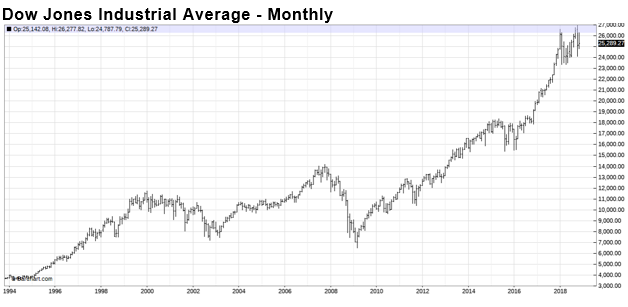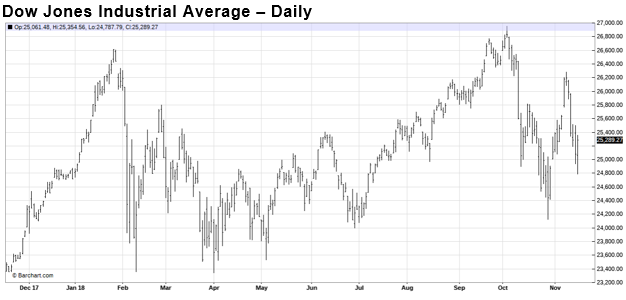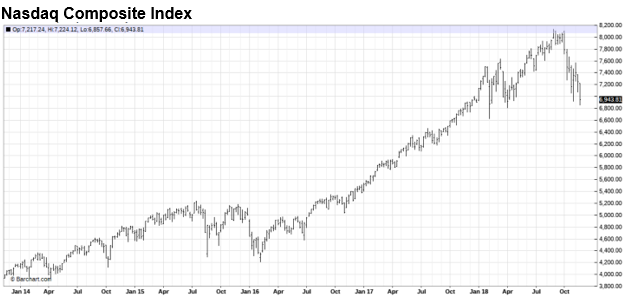FORECASTS & TRENDS E-LETTER
by Gary D. Halbert
November 20, 2018
1. Stock Markets Shift Into A More Volatile Gear
2. Most Cited Reasons For the Current Market Decline
3. Has the US Stock Market Run Out of Bounces?
4. Worried? How to Diversify Beyond Stocks & Bonds
Q3 hedge fund letters, conference, scoops etc
Overview
Stock prices around the world are in a tailspin which may get worse before it gets better. As of the end of last week, 11 out of 23 major global stock markets were down the requisite 20% or more from their highs to qualify as bear markets. This is very troubling.
The US stock markets have been leading the world in terms of performance and were still up about 2% for the year at the end of last week. Not anymore: The Dow and the S&P 500 were sharply lower yesterday and so far today and are now in negative territory for the year. Today, I’ll focus on the current downward correction in stocks, what’s causing it and, unfortunately, why it may take awhile before it gets better.
Most investors are getting really nervous! Many are looking for alternatives to stocks. At the end, I’ll recommend several alternative investments that do not involve stocks or bonds. Maybe it’s time you take a serious look at them as a way to diversify your portfolio for times like this.
Stock Markets Shift Into a More Volatile Gear
I haven’t had a lot to say about the stock market this year because, frankly, there hasn’t been much to talk about. We are currently in the second longest bull market in history, going on 10 years since the low in early 2009. This has been a “buy the dips” market ever since – the current downward correction notwithstanding.
We’ve seen numerous new record highs set along the way. There’s been nothing to do but stay 100% invested, ride out the occasional dips and count your growing profits. The Dow Jones Industrial Average has soared from around 7,000 in early 2009 to near 27,000 at the record high set in October.
Depending on where you mark the low in early 2009 and the record high in October, the Dow gained about 385% — very impressive, right? But while it is the second longest bull market in history, the gain has fallen well short of the 582% gain from the low in 1987 to the high in 2000. You can read that fact one of two ways:
- It could mean the market still has plenty of potential to move even higher, which seems for now to be the prevailing wisdom; or
- The market is significantly underperforming the bull market that began in 1987, and maybe we should be worried it’s in the process of topping out.
Whichever way you view it, the market action since the correction began last month has had an eerie, troubling feel about it. Clearly, volatility has exploded! Yet some say it’s no different than the correction we experienced in February of this year. Let’s take a closer look at that.
On the one hand, we could say that the current downward correction has not been as steep or as fast as the plunge we saw in February, and the market went on to make new record highs following that setback. Maybe it will again this time.
We could also say that back in February it took the market several months to re-establish the bull market trend. Maybe the same will be true this time. We’ll see. But to me at least, this time feels different. The current market seems to want to go down a lot more than it wants to go up.
Most Cited Reasons For the Current Market Decline
Whenever the stock market goes into a tailspin, the pundits put forth reasons why. This time is no different. Here are a few of the major reasons cited for the current correction, in no particular order.
Fed Tightening/Rising Interest Rates. With the US economy booming and unemployment at decade lows, there is no longer any doubt that the Fed will continue to hike short-term interest rates. There is a broad consensus now (above 90%) that the Fed will vote for another rate hike at its December 18-19 policy meeting.
There is also a broad consensus that the Fed will raise rates 3-4 times in 2019 starting with its March meeting, followed by additional hikes likely in June, September and possibly December.
The yield on the bellwether 10-year Treasury note is now well above 3% and appears to be headed considerably higher over the next year. This has been weighing on stocks for the last month or two.
President Trump’s Trade War Threats. The president continues to rattle the sabers about a trade war and issue actual sanctions, especially against China. Trump maintains that such threats and actions are part of a strategy to get China and others to the bargaining table, but that remains to be seen.
In any event, the stock markets don’t like this since more and more US companies are complaining that the trade sanctions and tariffs are hurting their bottom lines (ie – profits). While US stocks have been negatively affected by these trade war concerns, many foreign markets have gone down much more than we have.
Various Other Concerns. In October, the International Monetary Fund (IMF) cut its 2019 forecast for global economic growth from 3.9% in July to 3.7%, citing growing concerns about a trade war. The IMF cut its 2019 US growth forecast to 2.5% from 2.7% previously, while it cut China’s 2019 growth forecast to 6.2% from 6.4% in July and down from 6.6% earlier this year.
Next, there are growing concerns that Italy is headed for a financial crisis which could take the European Union down with it. Italy’s government spending is clearly out of control, and its current populist leaders adamantly refuse to do anything about it. Bond yields have spiked and many fear that Italy will be the catalyst for the next global financial meltdown.
On another front, US technology stocks which have led the bull market in recent years have taken a beating in the last month. Some big-name tech stocks are down over 20% (bear market), and the Nasdaq Composite Index is down over 15% from the peaks in September/October.
The question is, has anything fundamentally changed with US tech stocks? I think not. These high-flying markets were overdue for a correction, which could get worse before it gets better. The greater concern is the stock market as a whole.
Has the US Stock Market Run Out of Bounces?
On paper at least, the US stock market still has the potential for another bounce to new record highs. As discussed above, the Dow is up about 385% in the current advance versus 582% in the bull market that began in 1987. The question now is, has the market run out of bounces? For now, most analysts believe the answer is NO.
While there are plenty of reasons to believe the US stock market has at least one or more bounces to new record highs ahead, there are also reasons to believe this market is at or near a major top. Here’s the one that bothers me the most:
Numerous global stock markets have already plunged into a bear market. As of the end of October, 11 of 23 major stock markets around the world have fallen the requisite 20% from their highs to qualify as bear markets. This is troubling.
Yet the US market is the closest to its 52-week high of any of the global markets, and the Dow and S&P 500 indexes were both still up a little over 2% for the year as of the end of last week. While that’s among the strongest performance in the world this year, both markets declined sharply yesterday and so far today. This suggests the current downward correction could get worse before it gets better.
Worried? How to Diversify Beyond Stocks & Bonds
Whether the US stock market has another bounce to new record highs remains to be seen. What I can tell you is that my clients are more nervous right now than I’ve seen them in years, because of the extreme volatility we’ve seen recently.
Keep in mind that my clients are generally very sophisticated investors who have been in the markets for decades. They don’t spook easily. However, more and more of my clients are choosing to diversify into investment strategies we offer that have virtually nothing to do with stocks or bonds. While not abandoning equities, they are very interested in adding investments in other non-correlated asset classes.
They are increasingly putting money into professionally managed programs such as BROADMARK (real estate lending) and JLL Income Property Trust and COLE Real Estate Income (both commercial real estate strategies). We also have a successful insurance-linked strategy that does not involve stocks or bonds. You can click on the links above to see their actual performance records of these programs.
You should consider diversifying with these non-equity strategies. Call Phil Denney or Spencer Wright at 800-348-3601 to get more information. Phil and Spencer are non-commissioned so there’s never any pressure to invest. They have both been with me for nearly 20 years.
Happy Thanksgiving to Everyone!!
Here we are again, the holidays are upon us. Thanksgiving is always an exciting time for me. The kids will be arriving on Wednesday, one with his spouse and the other with her fiancé. Other relatives and in-laws will be coming as well.
We will be having turkey, ham, my cornbread dressing and all the trimmings. I’m trying something new this year – I’m going to deep-fry my turkey, which is a growing trend in the South and elsewhere. I bought a turkey frying kit a couple of weeks ago and tried it out after “injecting” the turkey. Everyone raved about how moist it was.
Like every year, I am most thankful for my family and all the blessings God has bestowed upon us. I am thankful for my loyal staff here at Halbert Wealth Management. And I am certainly thankful for the many clients we have all across the country! Without you there would be no need for this E-Letter or my Blog.
May everyone reading this have a very Happy & Blessed Thanksgiving!
* I will not be posting my Blog on Thursday.
All the best,
Gary D. Halbert
SPECIAL ARTICLES
5 Reasons the Stock Market is Down
Will Our Monstrous Debt Kill the Economy?
Gary’s Between the Lines Blog: Debt-to-GDP Ratio Projected To Double in 20 Years



